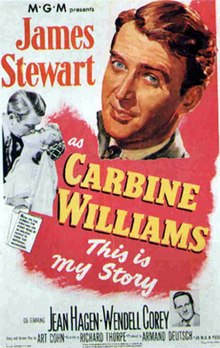Carbine Williams
| Carbine Williams | |
|---|---|
 | |
| Directed by | Richard Thorpe |
| Written by | Art Cohn |
| Produced by | Armand Deutsch |
| Starring | James Stewart |
| Cinematography | William C. Mellor |
| Edited by | Newell P. Kimlin |
| Music by | Conrad Salinger |
| Distributed by | Metro-Goldwyn-Mayer |
Release date |
|
Running time | 92 minutes |
| Country | United States |
| Language | English |
| Budget | $1,111,000[1] |
| Box office | $2,589,000[1] |
Carbine Williams is a 1952 American drama film directed by Richard Thorpe and starring James Stewart. The film follows the life of its namesake, David Marshall Williams, who invented the operating principle for the M1 Carbine while in a North Carolina prison. The M1 Carbine was used extensively during World War II.
Originally filmed in black-and-white, it is also shown in a computer-colorized version.[2]
Plot
The film follows the life of David Marshall Williams (James Stewart), who was a member of the Winchester team that invented the semi-automatic M1 Carbine used in World War II. Williams was found distilling illegal moonshine, and was held responsible for the death of a federal officer during a raid on his still. He was sentenced to thirty years hard labor. He cycled through the prison system, until a firm, but compassionate warden, H.T. Peoples (Wendell Corey), allowed him to work in a prison tool shop. There, he invented the gas system for his famous rifle. Williams was released from prison in 1929 and worked with Winchester Firearms on development of the M1 Carbine.
Cast
- James Stewart as David Marshall 'Marsh' Williams
- Jean Hagen as Maggie Williams
- Wendell Corey as Capt. H. T. Peoples
- Carl Benton Reid as Claude Williams
- John Smith as David Marshall's brother (uncredited)
- James Arness as David Marshall's oldest brother[3]
Reception
According to MGM records the film earned $1,787,000 in the US and Canada[4] and $802,000 elsewhere, resulting in a profit of $575,000.[1]
Comic book adaption
References
- ^ a b c The Eddie Mannix Ledger, Los Angeles: Margaret Herrick Library, Center for Motion Picture Study.
- ^ Maltin, Leonard, ed. (2007). Leonard Maltin's 2008 Movie Guide. New York: Signet. p. 211. ISBN 978-0-451-22186-5.
- ^ James Arness#Filmography
- ^ See also 'Top Box-Office Hits of 1952', Variety, January 7, 1953
- ^ "Fawcett Movie Comic #19". Grand Comics Database.
External links
- 1952 films
- 1950s biographical films
- 1950s drama films
- American biographical films
- American films
- American black-and-white films
- English-language films
- Films directed by Richard Thorpe
- Films set in North Carolina
- Films set in the 1920s
- Metro-Goldwyn-Mayer films
- Films adapted into comics
- 1950s drama film stubs
- Biographical film stubs
